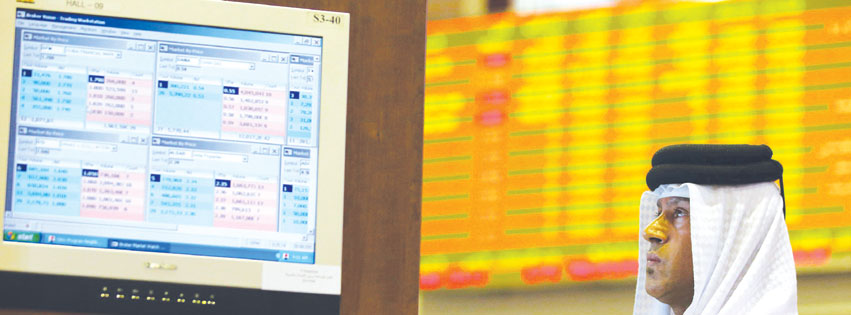Reuters/Doha
Demand from foreign investors - many of them "passive" funds closely tracking the MSCI emerging markets index - lifts stock markets in the Qatar and United Arab Emirates, which will join the index at the weekend.
Abu Dhabi's bourse leads gains, rising 2.2 percent largely on the back of National Bank of Abu Dhabi, which jumps 7.3 percent.
Dubai's index adds 1.7 percent and Qatar's benchmark is up 1.0 percent, both markets also supported by individual stocks that will be included in the MSCI index.
"I guess it's mostly foreign investors who are buying today," says Sebastien Henin, head of asset management at The National Investor.
"We have a lot of buyers in the market. We should expect a very strong rally today in Dubai and Abu Dhabi."
While "active" foreign funds and retail investors have already built big positions in the Qatar and UAEsince the upgrade was announced last June, passive funds have generally started doing so only this week, and some may only have begun today.
Several hundred million dollars of fresh inflows from passive funds are expected in each market - enough to move share prices on a daily basis, though not enough to make much difference in the long run to markets with capitalisations of well over $100 billion each.
----------------------------------------------------------------
0545 GMT - Profit-taking looks set to continue on Thursday in many of the United Arab Emirates and Qatar stocks that will join MSCI's emerging markets index this weekend, but a few MSCI picks that have underperformed may attract buying.
A monthly Reuters survey of 15 Middle East fund managers, published on Thursday, showed many funds believe the Qatar and UAE may be peaking for now: only 20 percent expect to increase allocations to UAE equities in the next three months, while 40 percent expect to cut them.
In Qatar's stock market, 20 percent expect to increase their allocations while 33 percent foresee cutting them. The funds are most bullish on the Saudi Arabian and Egyptian stock markets.
Nineteen companies from the Qatar and UAE are joining the MSCI index, according to final list that MSCI published on May 14. The stocks' performance, however, has varied significantly, so some of the laggards may still attract fresh buying.
"You're going to see active short-term trading in the 10 members of MSCI Qatar and nine members of MSCI UAE," said Sanyalak Manibhandu, manager of research at NBAD Securities.
"The stocks that have underperformed may see buying while those who were outperforming may come under selling pressure."
Qatari Islamic lender Masraf Al Rayan is the top gainer since mid-May, having added 19 percent. It is followed by National Bank of Abu Dhabi and Abu Dhabi Commercial Bank, up 10 and 9 percent respectively.
Dubai's Arabtec is the top loser so far, down 15 percent, although it has posted the highest year-to-date gains, more than tripling in value.
The company announced late on Wednesday that chief executive Hasan Ismaik had raised his stake to 21.46 percent from 8.03 percent, describing this as a vote of confidence in the firm. While some retail investors may view this as bullish for the stock, however, many institutions view Arabtec as overvalued.
Among other recent MSCI underperformers, Emaar Properties has shed 11 percent and Dubai Islamic Bank has fallen 9 percent.
Provisional results show general Abdel Fattah al-Sisi the winner in Egypt's presidential election, but low voter turnout could undermine his credibility and is likely to put a cap on the stock market.
On Wednesday the market index dropped 2.3 percent, its biggest fall in nearly two months, to 8,538 points. It has initial technical support around 8,400 points, where it peaked in late April and early May. (Reporting by Olzhas Auyezov; Editing by Andrew Torchia)

